|
|
|
Sort Order |
|
|
|
Items / Page
|
|
|
|
|
|
|
| Srl | Item |
| 1 |
ID:
147717
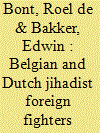

|
|
|
|
|
| Summary/Abstract |
In recent years, Belgium and the Netherlands have been confronted with relatively many citizens or residents who have traveled to Syria and Iraq to join and fight with jihadist groups — 388 Belgian and 220 Dutch as estimated by the respective authorities. This article provides an overview of the phenomenon of jihadist foreign fighters in the Low Countries, analyzing their characteristics, motivations, and roles in the war in Syria and Iraq. It compares the Belgian and Dutch cases, focusing on key aspects, such as age, sex, and geographical and socioeconomic background.
|
|
|
|
|
|
|
|
|
|
|
|
|
|
|
|
| 2 |
ID:
124144
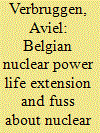

|
|
|
|
|
| Publication |
2013.
|
| Summary/Abstract |
Nuclear decision-making is embedded in slowly evolving political, economic and financial institutions. Belgium houses extended nuclear activities, mostly under French control, for example: SUEZ-GDF and EDF own all Belgian nuclear power plants. But a 2003 law mandates the closure of Belgium's nuclear power plants at a service age of 40 years; only force majeure could lift the strict obligation. Opposition to the law argued with climate change danger, financial losses, and loss-of-load risks. The financial issue got interwoven with a fuzzy debate on the definition, height and appropriation of “nuclear rents”. As plausible hypothesis is adopted: the prospected transfer of hundreds millions of euro from power companies to the public interest will create public support for life extension. But the nuclear rents discussion had faded in July 2012 when the Belgian government admitted a 10-year life extension for TIHANGE I (962 MW) and imposed the closure of the 2×433 MW DOEL I and II. Loss-of-load risk was the government's only public argument. The opacity of the decision process and its “fifty-fifty” outcome do not allow proper testing of the hypothesis. The case illustrates that politicians cannot bind their followers except through the deployment of alternative power sources.
|
|
|
|
|
|
|
|
|
|
|
|
|
|
|
|
| 3 |
ID:
143101
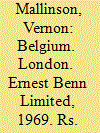

|
|
|
|
|
| Publication |
London, Ernest Benn Limited, 1969.
|
| Description |
240p.hbk
|
|
|
|
|
|
|
|
|
|
|
|
Copies: C:1/I:0,R:0,Q:0
Circulation
| Accession# | Call# | Current Location | Status | Policy | Location |
| 007272 | 949.3/MAL 007272 | Main | On Shelf | General | |
|
|
|
|
| 4 |
|
| 5 |
ID:
108692
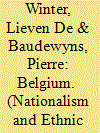

|
|
|
|
|
| Publication |
2009.
|
| Summary/Abstract |
Due to reversal of the center-periphery cleavage between Flemish and Francophones by the 1960s, the Belgian unitary state was transformed gradually into a fully fledged federal state. In spite of this empowerment of the regions and communities, the aftermath of the June 2007 general elections showed that Belgium was moving into a crucial, and maybe final, phase of its community conflict. Conflicts over socioeconomic autonomy have replaced the original language issues, essentially opposing on the one hand the Francophones in Wallonia and Brussels unanimously defending the institutional status quo of the current federal state, and on the other hand most Flemish political elites calling for radical autonomy, and some even for independence. In the near future, undoubtedly more policy competences will be devolved, but this "lighter but fitter Belgium" outcome may not satisfy Flemish elites.
|
|
|
|
|
|
|
|
|
|
|
|
|
|
|
|
| 6 |
|
| 7 |
|
| 8 |
ID:
101871


|
|
|
|
|
| Publication |
2010.
|
| Summary/Abstract |
RUSSIAN-BELGIAN RELATIONS have deep historical roots. Traditionally, the trailblazers in their development were craftsmen and traders. Ever since the days of Lord Novgorod the Great, European wines, fabrics and laces have been held in great esteem. Meanwhile, those goods were brought to us by Frisian merchants from the Flemish coast. They also delivered Russian furs, flax fabrics, resin, and hemp to Western Europe.
|
|
|
|
|
|
|
|
|
|
|
|
|
|
|
|
| 9 |
ID:
162771
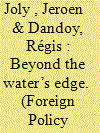

|
|
|
|
|
| Summary/Abstract |
Based on the growing scholarly recognition of domestic influences on foreign policy, political parties are considered to be among the main drivers behind foreign policy in most parliamentary democracies. In order to understand party influences on the governmental foreign policy agenda, we examine what determines the congruence between party manifestos and the ensuing government agreements in Belgium from 1978 to 2008. We find that a combination of variables related to political parties’ negotiation position during government formation and regarding their ideological left-right position co-determine their impact on the content of the coalition agreement in terms of foreign policy priorities. This study shows that political parties differ in their foreign policy priorities and that they compete to see these priorities included in the future government’s policy program.
|
|
|
|
|
|
|
|
|
|
|
|
|
|
|
|
| 10 |
ID:
127828
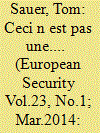

|
|
|
|
|
| Publication |
2014.
|
| Summary/Abstract |
There is hardly anybody in Belgium who publicly defends the continued deployment of US tactical nuclear weapons on Belgian territory. The longer these weapons stay, the more the existing nuclear weapons policy and by extension North Atlantic Treaty Organization itself will be regarded as illegitimate. While one should not expect massive demonstrations similar to that at the beginning of the 1980s, the pressure to protest increases. By describing the different societal and political actors in Belgium and their respective views on the possible withdrawal of US tactical nuclear weapons, this article tries to explain the gap between policymakers and citizens on this issue. The main explanatory variables are a low-profile diplomatic culture and the lack of a strong link between the anti-nuclear movement and the political parties in power, resulting in the absence of political leaders at the governmental level, who clearly speak out in favor of withdrawal.
|
|
|
|
|
|
|
|
|
|
|
|
|
|
|
|
| 11 |
ID:
171649
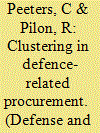

|
|
|
|
|
| Summary/Abstract |
This paper examines the importance of closer co-operation in defence-related procurement. Led by the decision that Belgium will lead the procurement of 12 Mine CounterMeasures Vessels (MCMV), the case of a potential Belgian naval construction cluster is discussed. The feasibility of a potential cluster is investigated by looking at key elements of a successful naval construction cluster, the Dutch naval construction cluster, and comparing those key elements to the current Belgian situation. Forming a sustainable Belgian naval construction cluster will be difficult. Most of the procurement process of the MCMVs is set on a European tender. In the long run, due to the absence of both a launching customer and leader firms, no party is able to carry the cluster with investments and knowledge spill-overs. In order to keep public support for large defence-related investments, clustering around the MCMV integration system and proactive cluster support is recommended.
|
|
|
|
|
|
|
|
|
|
|
|
|
|
|
|
| 12 |
ID:
101063
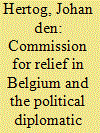

|
|
|
|
|
| Publication |
2010.
|
| Summary/Abstract |
During the First World War, the Commission for Relief in Belgium (CRB) supplied occupied Belgium with food, provoking discord between military and political leaders on both sides. The CRB's work undermined the Allies' economic blockade of the enemy, attracting military criticism. In Germany, politicians favoured sustaining the food supply to prevent unrest, whilst the Army wanted to exploit Belgium's resources. From 1916 onwards, the CRB became a bone of contention in Germany in the dispute between military and political leaders about unrestricted submarine warfare. It also loomed large in the political and military debate about the attitude to neutral countries: the Allies wanted them to brave the German threat and cooperate with the blockade policy-otherwise, food imports from Allied countries would be forbidden. Tonnage and food for the CRB were incorporated into the negotiations with neutral countries about their imports and the use of home-grown produce. The debates about the CRB thus exemplify the relationship between military events and the war's economic and social significance. This study of the CRB shows that political/diplomatic historiography can bridge the gap between the military and socioeconomic history of the First World War.
View Full Text Article
|
|
|
|
|
|
|
|
|
|
|
|
|
|
|
|
| 13 |
ID:
137508
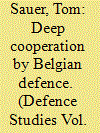

|
|
|
|
|
| Summary/Abstract |
Despite tight budgetary constraints, the number of military interventions in which Belgium participated is substantial. The Belgian air force and navy were able to retain their basic war fighting capabilities after the Cold War. The land forces lost and are losing capabilities because of a lack of strategic anchoring. The most important Belgian contribution to international and European defence thinking has to be found in the innovative approach with respect to Belgian–Dutch naval cooperation. The latter could be an example for Europeanizing and generating the use of military capabilities in order to make the EU a strategic actor in the multipolar world.
|
|
|
|
|
|
|
|
|
|
|
|
|
|
|
|
| 14 |
ID:
111861
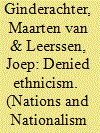

|
|
|
|
|
| Publication |
2012.
|
| Summary/Abstract |
The Walloon movement is the lesser-known counterpart to the Flemish movement in Belgium. In contemporary political debate it presents itself, and is usually perceived, as a civic and voluntaristic movement predicated on the values of democracy, freedom, openness and anti-nationalism. As such it is contrasted against its Flemish counterpart, which accordingly is characterised as tending towards an ethnic exclusivist form of nationalism hinging on descent, culture and language. However, the historical record behind these representations shows that the Walloon movement is rooted in ethno-cultural as much as social politics, and that it has always contained both civic and ethnic elements to varying degrees. This article highlights the Walloon movement in order to analyse the language and national stereotypes in which national movements are characterised both in political rhetoric and in scholarly analysis. The case is particularly relevant for the problematic usage of the 'civic-ethnic' opposition, slipping between the discourses of antagonism and analysis; one type of such slippage is here identified as 'denied ethnicism'.
|
|
|
|
|
|
|
|
|
|
|
|
|
|
|
|
| 15 |
ID:
144926
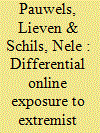

|
|
|
|
|
| Summary/Abstract |
The present study applies Social Learning (Differential Association) Theory to the explanation of political violence, focusing on exposure to extremist content through new social media (NSM) and controlling for key variables derived from rival theories. Data are gathered using (a) a paper-and-pencil study among high school students, and (b) a web survey targeting youths between 16 and 24 years old. A total of 6020 respondents form the dataset. Binary logistic regression is used to analyze the data. Results show that even when controlling for background variables, strain variables, personality characteristics, moral values, and peer influences, the statistical association between measures of extremism through NSM (ENSM) and self-reported political violence remains significant and fairly constant. The most persistent effects are found for those measures where individuals actively seek out extremist content on the Internet, as opposed to passive and accidental encounters using NSM. Furthermore, offline differential associations with racist and delinquent peers are also strongly and directly related to self-reported political violence, as are some mechanisms from rival perspectives. This indicates that political violence can only partially be explained by social learning and suggests that the impact of ENSM is mediated by real-world associations and that the offline world has to be taken into account.
|
|
|
|
|
|
|
|
|
|
|
|
|
|
|
|
| 16 |
ID:
132611
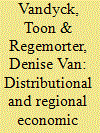

|
|
|
|
|
| Publication |
2014.
|
| Summary/Abstract |
We analyse the macroeconomic and distributional effects of increased oil excises in Belgium by combining a regional Computable General Equilibrium (CGE) model with a microsimulation framework that exploits the rich detail of household-level data. The link between the CGE model and the microlevel is top-down, feeding changes in commodity prices, factor returns and employment by sector into a microsimulation model. The results suggest that policymakers face an equity-efficiency trade-off driven by the choice of revenue recycling options. When the additional revenue is used to raise welfare transfers to households, the reform is beneficial for lower income groups, but output levels decrease in all regions. However, when the energy tax revenue is used to lower distortionary labour taxes, the tax shift is slightly regressive. In this case, national GDP is hardly affected but regional production levels diverge. The impact of the environmental tax reform on income distribution depends strongly on changes in factor prices and welfare payments, whereas sector composition is an important determinant for regional impact variation.
|
|
|
|
|
|
|
|
|
|
|
|
|
|
|
|
| 17 |
ID:
082682
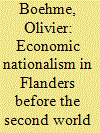

|
|
|
|
|
| Publication |
2008.
|
| Summary/Abstract |
In this article the author makes the claim that economic nationalist ideas had their origins in the Flemish Movement before the First World War and were further developed in the interwar period. This is an important modification of the classical view that Flemish nationalism before the Second World War was mainly focused on the linguistic and cultural situation in Belgium. Central to this contribution is the view of economic nationalism as an ideology using social and economic means for nationalistic purposes, although there are variations in the degree to which economy and nationalism are tools or purpose. In any case there was not much consistency, because there were different views on what constituted the interests of the 'Flemish nation', and which social and economic principles should be adopted. In addition, a movement that did not show much unity could not construct a homogeneous social-economic agenda
|
|
|
|
|
|
|
|
|
|
|
|
|
|
|
|
| 18 |
ID:
108703
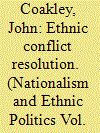

|
|
|
|
|
| Publication |
2009.
|
| Summary/Abstract |
This article generalizes on the basis of a set of case studies of ethnic conflicts that have followed different routes towards the goal of a long-term settlement: Belgium, Spain, Northern Ireland, Bosnia and Herzegovina, Cyprus, Lebanon, South Africa, and Sri Lanka. It begins by reviewing the significance of ethnicity in the modern state, exploring the political implications of different terminologies in this area. Having examined the patterns of political mobilization of ethnic groups (whether in the form of the party system or in the shape of military-type formations), it looks at the kinds of political outcome that have been associated with settlement processes. In addition to "solutions" that would be regarded as politically unacceptable, it identifies three common features which, depending on specific local circumstances, commonly occur: federal or other territorial arrangements, consociational government, and the political integration of minorities.
|
|
|
|
|
|
|
|
|
|
|
|
|
|
|
|
| 19 |
ID:
074372


|
|
|
|
|
| Publication |
2006.
|
| Summary/Abstract |
This article explores the impact of the EU Code of Conduct on Arms Exports on national legal frameworks, using the case studies of Belgium, Germany and Italy. It considers the differential impact of Europeanisation on high- and low-regulating countries and how non-legally binding decisions agreed in the framework of the CFSP nevertheless exert pressure on member states. It argues that the Europeanisation impact of the Code has not been insignificant, but that it has not had a uniformly strengthening impact. Rather, the Europeanisation of the Code of Conduct has promoted convergence, weakening strong national frameworks and strengthening weak ones.
|
|
|
|
|
|
|
|
|
|
|
|
|
|
|
|
| 20 |
ID:
153166
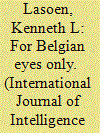

|
|
|
|
|
| Summary/Abstract |
The Kingdom of Belgium has two intelligence services. The domestic State Security service, the Veiligheid van de Staat–Sûreté de l’Etat (VSSE), was established in 1830. A military intelligence service, the Algemene Dienst Inlichtingen en Veiligheid–Service Général du Renseignement et de la Securité (ADIV/SGRS–ACOS-IS1 Within the Belgian Defence flow chart, the service is known as ACOS-IS, Assistant Chief of Staff Intelligence and Security.
), was established in 1915 to provide intelligence for the military and act as a security service for the Belgian Army’s operations.
|
|
|
|
|
|
|
|
|
|
|
|
|
|
|
|
|
|
|
|
|